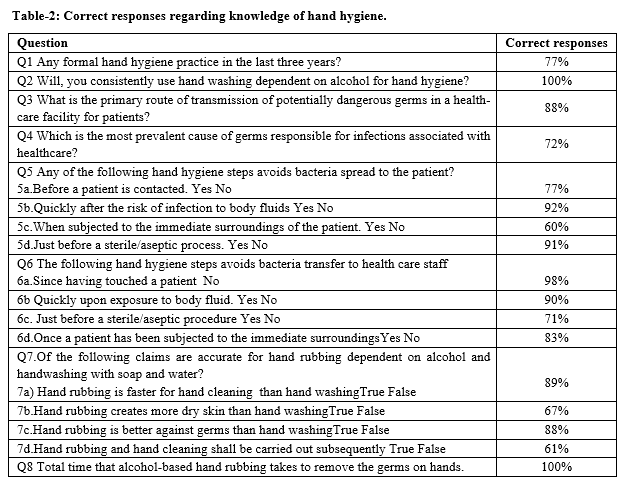Impact of Pandemic COVID-19 on the knowledge and attitude of hand hygiene among medical graduates
Abstract
Introduction: Hand hygiene is one of the most important measures among infection control practices. Knowledge of hand hygiene among medical graduates crucial in minimizing nosocomial infections. During the pandemic COVID-19, awareness is being created through various routes concerning hand hygiene to combat the pandemic. The current study targeted at determining the impact of awareness programs on hand hygiene awareness among medical graduates.
Materials and Methods: This was a cross-sectional study based on a questionnaire to evaluate the knowledge of hand hygiene among second-year graduate medical students. The structured questionnaire was sent to the participants through the email and Whatsapp in the form of a google doc link. The degree of knowledge of hand hygiene was determined by dividing the responses into three classes based on a score of more than 75% considered good, 50-74% moderate, and 50% considered poor as less than. Individual responses received and the data analyzed.
Results: A total of 95 students were included in the study. Out of these 54 (56.84%) were females and 41 (43.16%) males. A preponderance of knowledge level was found to be good (87%) among the participants. It has been observed that the majority of students had a positive attitude towards hand hygiene (98-100%).
Conclusion: It was noticed from the results obtained in this study, that a significant rise in the knowledge levels and positive attitude among medical graduates during pandemic COVID-19.
Downloads
References
World Health Organization. Novel coronavirus-China. Jan 12, 2020. (accessed Apr 19, 2020). Available at https://www.who.int/csr/don/12-january-2020-novel-coronavirus-china/en/.
WHO Coronavirus disease. Available at https://www.who.int/emergencies/diseases/novel-coronavirus-2019.
Coronaviridae Study Group of the International Committee on Taxonomy of Viruses. The species Severe acute respiratory syndrome-related coronavirus: classifying 2019-nCoV and naming it SARS-CoV-2. Nat Microbiol. 2020;5(4):536-544. doi: http://doi.org/10.1038/s41564-020-0695-z.
Huang C, Wang Y, Li X, Ren L, Zhao J, Hu Y, et al. Clinical features of patients infected with 2019 novel coronavirus in Wuhan, China. The Lancet. 2020;395(10223):497-506. doi: https://doi.org/10.1016/S0140-6736(20)30183-5.
Ong SW, Tan YK, Chia PY, Lee TH, Ng OT, Wong MS, et al. Air, Surface Environmental, and Personal Protective Equipment Contamination by Severe Acute Respiratory Syndrome Coronavirus 2 (SARS-CoV-2) From a Symptomatic Patient. JAMA. 2020;323(16):1610-1612. doi: http://doi.org/10.1001/jama.2020.3227.
World Health Organization. Hand Hygiene Knowledge Questionnaire for Health-Care Workers. World Health Or-ganization. 2009. Available from: http://www.who.int/ gpsc/5may/Hand_Hygiene_Knowledge_Questionnaire.doc?ua=1.
Herbert VG, Schlumm P, Kessler HH, Frings A. Knowledge of and adherence to hygiene guidelines among medical students in Austria. Interdisciplinary perspectives on infectious diseases. 2013;2013. doi: http://doi.org/10.1155/2013/802930.
Anderson JL, Warren CA, Perez E, Louis RI, Phillips S, Wheeler J, et al. Gender and ethnic differences in hand hygiene practices among college students. Am J Infect Cont. 2008;36(5):361-368. doi: http://dx.doi.org/10.1016/j.ajic.2007.09.007.
Al Kadi A, Salati SA. Hand hygiene practices among medical students. Interdisciplin Perspect Infect Dis. 2012;2012. doi: http://doi.org/10.1155/2012/679129.
Nair SS, Hanumantappa R, Hiremath SG, Siraj MA, Raghunath P. Knowledge, attitude, and practice of hand hygiene among medical and nursing students at a tertiary health care centre in Raichur, India. 2012. doi: http://doi.org/10.1155/2014/608927.
Ariyarathne M, Gunasekara T, Weerasekara M, Kottahachchi J, Kudavidanage B, Fernando S. Knowledge, attitudes and practices of hand hygiene among final year medical and nursing students at the University of Sri Jayewardenepura. Sri Lankan J Infect Dis. 2013;3(1):15-25. doi: http://doi.org/10.4038/sljid.v3i1.4761.
Feather A, Stone SP, Wessier A, Boursicot KA, Pratt C. 'Now please wash your hands': the handwashing behaviour of final MBBS candidates. J Hosp Infect. 2000;45(1):62-64. doi: http://doi.org/10.1053/jhin.1999.0705.
Yang C. Does hand hygiene reduce SARS-CoV-2 transmission?. Graefes Arch Clin Exp Ophthalmol. 2020;258(5):1133-1134. doi: http://doi.org/10.1007/s00417-020-04652-5.
Alford RH, Kasel JA, Gerone PJ, Knight V. Human influenza resulting from aerosol inhalation. Proc Soc Exp Biol Med. 1966;122(3):800-804. doi: http://doi.org/10.3181/00379727-122-31255.
Allegranzi B, Pittet D. Role of hand hygiene in healthcare-associated infection prevention. J Hosp Infect. 2009;73(4):305-315. doi: http://doi.org/10.1016/j.jhin.2009.04.019.
Oliveira AC, de Paula AO, Gama CS. Monitoring hand hygiene: direct observation versus self-report rates. Enfermería Global. 2017;16(4):344-353. doi: http://doi.org/10.1590/s1980-220x2016037803217.
Ellingson K, Haas JP, Aiello AE, Kusek L, Maragakis LL, Olmsted RN, et al. Strategies to prevent healthcare-associated infections through hand hygiene. Infect Control Hosp Epidemiol. 2014;35(S2):S155-S178. doi: http://doi.org/10.1086/677145.

Copyright (c) 2020 Author (s). Published by Siddharth Health Research and Social Welfare Society

This work is licensed under a Creative Commons Attribution 4.0 International License.


 OAI - Open Archives Initiative
OAI - Open Archives Initiative


